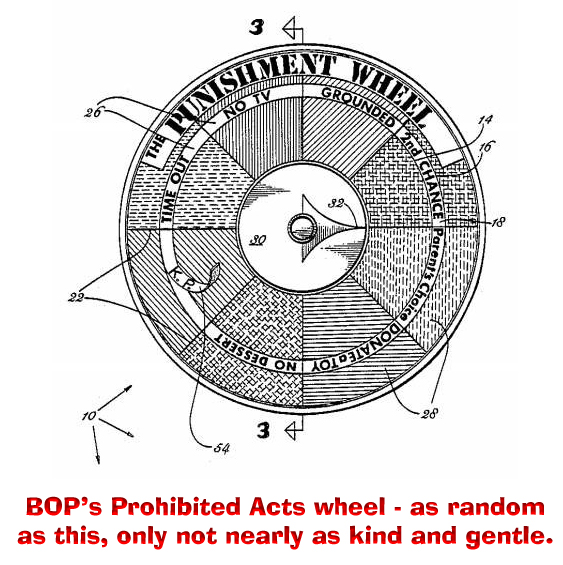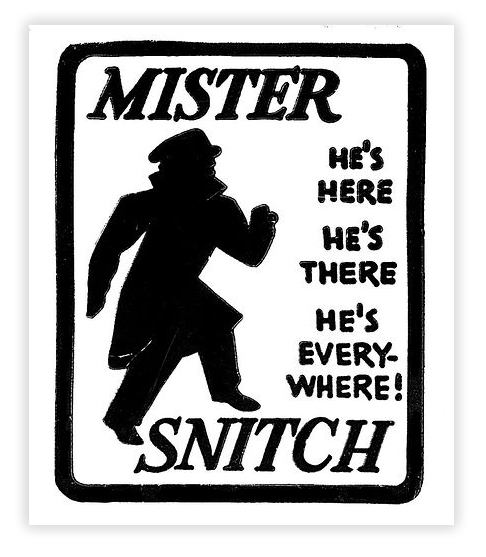We post news and comment on federal criminal justice issues, focused primarily on trial and post-conviction matters, legislative initiatives, and sentencing issues.

BOP SEEKS TO TOUGHEN PROHIBITED ACTS LIST
 There is little about prison life more arbitrary and random than inmate discipline. The offenses – like the infamous “engaging in anti-Soviet agitation” crime in communist Russia – are so general and squishy that virtually any conduct can be shaped and kneaded to fit within some offense confines.
There is little about prison life more arbitrary and random than inmate discipline. The offenses – like the infamous “engaging in anti-Soviet agitation” crime in communist Russia – are so general and squishy that virtually any conduct can be shaped and kneaded to fit within some offense confines.
The evidentiary standard that the prison must meet in order to find that an inmate is guilty of an offense is so low that if an inmate is charged, she is as good as convicted. The Supreme Court has declared it to be the “some evidence” standard:
This standard is met if there was some evidence from which the conclusion of the administrative tribunal could be deduced. Ascertaining whether this standard is satisfied does not require examination of the entire record, independent assessment of the credibility of witnesses, or weighing of the evidence. Instead, the relevant question is whether there is any evidence in the record that could support the conclusion reached by the disciplinary board.
Superintendent, Mass. Corr. Inst. v. Hill, 472 U.S. 445, 455 (1985),
Still, when the Federal Bureau of Prisons releases a proposed rule changing its list of prohibited acts, it’s a big deal. The BOP did so last Thursday, seeking public comment on a broad updating of its list of Prohibited Acts that sweepingly expands the conduct that is encompassed by some greatest severity category acts but dramatically cutting the use of disciplinary segregation.
Solitary confinement has gotten a well-deserved black eye in the last few years, and the BOP got that memo. Under the prohibited acts proposal, open for public comment until April 1, 2024, maximum first-offense disciplinary segregation would fall from a maximum of 365 days for a first 100-series violation to 60 days and 180 days to 30 days as a maximum punishment for a 200-series shot. No DS time could be assessed for a 300-series shot.
This is good. It makes the BOP look progressive and forward-thinking, exactly how an outfit that has jettisoned the expression “inmate” in favor of “Adults in Custody” ought to look. Correct. Compassionate. Fair.
However, most of the BOP’s disciplinary decisions don’t include a term in solitary as a sanction. Instead, the BOP has a whole menu of lesser punishments – including forfeiting good time, FSA credits, loss of commissary or phone or visiting privileges. The new proposal doubles down on lesser, more common penalties while looking virtuous for cutting seldom-used disciplinary segregation.
 The fun doesn’t stop there. The proposal rolls out “additional examples of privileges that may be removed as a potential sanction: video visits, electronic device(s), and the use of electronic mail and messaging of any kind, including, but not limited to, through the TRULINCS system.”
The fun doesn’t stop there. The proposal rolls out “additional examples of privileges that may be removed as a potential sanction: video visits, electronic device(s), and the use of electronic mail and messaging of any kind, including, but not limited to, through the TRULINCS system.”
The proposal expands a number of definitions of what constitutes particular prohibited acts, including
• Code 102 regarding escape will now include any unauthorized departure from the buildings, lands, property or perimeter (inside or outside) of any facility; unauthorized departure from community confinement, work detail, program or activity (whether escorted or unescorted); and unauthorized departure from any authorized location regardless of electronic monitoring devices.
• Code 108, possession of a hazardous tool – the code applied to people caught with cellphones – will now include as hazardous tools “items necessary in the use of these devices. Making these changes would allow for discipline “if telltale evidence of such items as a cellphone, electronic device, or escape paraphernalia were not found,” the BOP says, “but items which could only be used with prohibited items are found to have been used.”
• A new Code 194 is proposed, regarding unauthorized use of social media and fund transfer services. This Code would be applied “for accessing, using, or maintaining social media accounts” such as “Facebook, Twitter, Instagram, Snapchat, TikTok, etc… or directing others to establish or maintain social media accounts on the inmate’s behalf” for the purpose of committing criminal acts or any Greatest category prohibited act. This code would also prohibit inmate use of fund transfer services such as CashApp.
After the public comment period, a final version of the rule will be rolled out.
All of this matters because in text and in practice, the expansive prohibited acts definitions permit BOP employees – largely untrained in the disciplinary system – to write up inmates for conduct that seems far beyond any reasonable interpretation of the regs. In one case I worked on, an inmate became aware of a large stash of cellphones and other contraband. She had been trying to get the warden to sign off on a pending recommendation that she be sent to home confinement. When she explained to a BOP secretary that she wanted to talk to her unit manager about it, and hoped she could trade her information for the unit manager pushing the warden to sign off on her home confinement, the secretary accused her of trying to bribe a BOP employee.
The inmate was charged with Prohibited Act 216, which is described in the rules as “Giving or offering an official or staff member a bribe, or anything of value.” 28 CFR § 541.3, Table 1. Prohibited Act 216 is defined as a “high severity” offense. She got a hearing, after which the BOP hearing officer ruled that the evidence “shows you are willing to give information as long as you receive something in return. This demonstrates your willingness to bribe staff.”
The unit manager herself testified that she did not feel as though the inmate was trying to bribe her, but in the BOP, the allegation alone is usually treated as presumptive evidence of guilt. The secretary said it sounded like a bribe, so it was a bribe.

Every defendant who cooperates with the government in hopes of getting a lesser sentence does the same thing this prisoner did, trade useful information for potential benefit. No matter. Providing information that contributed to institutional security was considered to be a bribe. The prisoner lost 21 days of good conduct time, four months of commissary, spent two months locked up in a cell awaiting disposition (this did not include any disciplinary segregation time), and was transferred to a higher-security facility. What’s worse is that the disciplinary record will be paraded in front of her judge as an argument against a sentence reduction, which will adversely affect her recidivism score.
The inmate’s habeas corpus appeal is still pending, but even if she wins and gets her 21 days back, most of the damage has been done.
The BOP already routinely punishes inmates with the Greatest category discipline for just living in a cell or cubicle where a cell phone is found, whether the inmate even knew of its presence. Expanding the sweep of already expansive Prohibited Acts will only give BOP staff greater opportunity for mischief.
BOP, Inmate Discipline Program: Disciplinary Segregation and Prohibited Act Code Changes (February 1, 2024), 89 FR 6455
– Thomas L. Root

